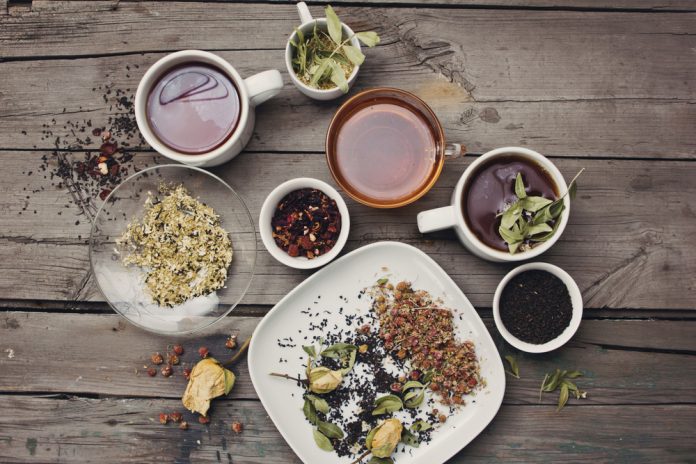Sereni’tea’: a state of calmness, peacefulness, and cheerfulness brought on by a piping hot cup of tea.
Herbal teas have been around for aeons but a little known fact is that herbal teas are not actual teas like green, black or earl grey tea. Herbal teas are made from dried fruits, flowers, spices or herbs fused together to create a variety of delicious tastes, flavours and aromas. Herbal teas are loaded with health benefits and are used as natural remedies for ailments, stress relievers, insomnia and antioxidants.
NOTE: Most dieticians recommend drinking herbal teas in moderation but only seeking medical assistance, as some teas can pose risks to certain health conditions.
Here is a list of herbal teas, their health benefits and definately worth a try —
Chamomile Tea
Chamomile tea is also called sleepy time tea. It is full of antioxidants, minerals and vitamins. As you might have guessed, it is consumed primarily to improve sleep quality, as a sleep aid and to assist insomnia. It is known to protect your liver, lower the risk of death from heart disease, an immune system support and fights off stomach ulcers and diarrhoea. Chamomile has also shown to reduce symptoms of premenstrual syndrome, control glucose, insulin resistance, and blood lipid levels among diabetics. With all these added health benefits, it makes Chamomile tea more than just a calming bedtime beverage.
Ginger Tea
Ginger tea is a spicy and luscious herbal tea that is brimming with healthy disease fighting antioxidants and full of vitamins and minerals such as vitamin B3, vitamin B6, iron, potassium and vitamin C.
Our good old “aadrak chai” aids in fighting off inflammation in the body as well as supporting the immune system. It is commonly used to soothe nausea, motion sickness and morning sickness among pregnant women, as well as patients going through chemotherapy. Studies show that it is a preventive against stomach ulcers, period pain and relieves indigestion or constipation.
NOTE: Another no no is herbal teas that contain added sugar and other additives, This is instrumental in herbal teas losing their essence.
Peppermint Tea
If your stomach is ever giving you trouble, peppermint tea is your best friend. Most of humanity have stomach issues making peppermint tea one of the most popular herbal teas in the world. It is primarily used to support digestive tract health help relieving digestive issues like indigestion, nausea, stomach pain, spasms in the intestines, oesophagus and colon and irritable bowel syndrome. Thats a lot of relief from mint. Peppermint oil has its set of benefits as an antioxidant, anticancer, antibacterial and antiviral aid.
Echinacea Tea
Echinacea is a herb that boosts the immune system and helps the body fight off viruses, germs and infections. It is an extremely popular recommendation for preventing and curing the common cold. Echinacea tea is known to shorten the duration of the common cold, lessen the severity of its symptoms and even a preventive. A warm cup of herbal goodness is just what you need to soothe your sore throat or clear your sinuses, try Echinacea Tea.
Lemon Tea and Lemon Balm Tea
Lemon balm tea has a light, lemony flavour and is especially known for its properties to relieve arterial stiffness and improve the elasticity of the arteries. Arterial stiffness is considered a risk factor for heart disease, stroke and mental decline. Lemon tea is also a go to soothing home remedy for sore throats and stuffy noses and this glorious drink is s simple to make, all you need is a fresh lemon and hot water to make lemon tea (a splash of honey and ginger can be added to make it more flavoursome.) It’s a tea totalers answer to an anytime drink that is loaded with vitamin C, antioxidants and increases hydration and your metabolic rate.
NOTE: Herbal tea is not a substitute for medical treatment but can be an additional remedy.
Rose Hip Tea
Rose hip tea is made from the fruit of the rose plant. It packs a punch when it comes to health benefits related to inflammation, weight management, and improving skin elasticity, keeping wrinkles at bay. Being high in vitamin C and anti-inflammatory properties it is known to reduce inflammation in people with rheumatoid arthritis and osteoarthritis.
Hibiscus Tea
Hibiscus tea is made from the vibrant flower of the hibiscus plant. The pinkish red colour hue and tart flavour sum up this refreshing infusion which can be enjoyed hot or cold. As enticing as its bold colour is, hibiscus tea offers numerous health benefits like — its antiviral properties, its positive effect on high blood pressure, its antioxidant powers that offer cardiovascular benefits and its vitamin and mineral content — potassium, calcium, magnesium.
An iced hibiscus tea is perfect to beat the heat this summer!
Passion Flower Tea
The leaves, stems and flowers of the passion flower plant are used to make this herbal tea. Passion flower tea trumps in relieving anxiety, improving sleep quality and also proven to help relieve the mental symptoms of opioid withdrawal, such as anxiety, irritability and agitation. Passion flower tea is a go to when it comes to restoring a sense of calmness to your body.
In Conclusion — Herbal teas are varied, each with its distinct flavours, aromas and benefits. Naturally free of sugar and calories along with its health-promoting effects makes it a no brainer when it comes to integrating it into your life.
Raise your pinky finger with those tea cups — *clink*








